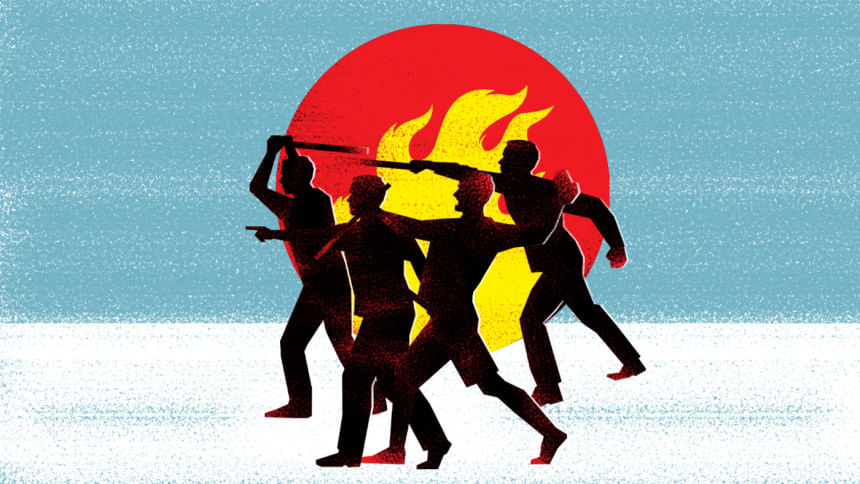Teenage gangs and a failing social order

In recent times, a disturbing pattern has taken hold in our society, with groups of boys barely out of their adolescence seen roaming the streets armed with knives. Recently, they again made headlines when a teen gang attacked four students from Dhaka University and Jagannath University in Lalmatia, leaving one of them stabbed. In the district towns, sometimes you see them film themselves stabbing rivals and proudly circulate the footage on social media. Across cities and districts, gangs with names like "Eagle," "Black Star," "Twist," or "Rockstar" have emerged. Their adopted slogans—"Born to Fly" or "Boss for Life", for example—are not merely adolescent fantasies, however. They are a declaration of rebellion against a society that seems to have no meaningful place for them except in the shadows of crime.
In other words, these incidents are part of a metastasising crisis exposing how deeply our social order is faltering. A casual look at the list of incidents would read like a grim catalogue: a child raped by teenage delinquents in Habiganj; expatriate families extorted by gangs in Noakhali; Rohingya minors in Cox's Bazar being absorbed into organised criminal groups; or towns or cities being plagued by "big brother"-backed networks that blend politics, crime, and juvenile desperation into a combustible mix. What we are witnessing is not random chaos but the crystallisation of a parallel social order—an alternative "career path" for a generation systematically failed by their institutions.
What's fuelling this surge in teenage crime? The answers lie not just in policing failures but also in the deeper fractures of our collective life. Poverty and economic deprivation set the foundation. Drug abuse—marijuana, yaba, even inhalants—further corrodes restraint, creating both dependence and the need for money that drives extortion, mugging, and theft. According to reports, many of these boys skip school, wander around in packs, and quickly become attached to the orbit of "big brothers". In return, they receive protection, identity, and even a distorted sense of purpose.
Drugs and poverty explain only part of the picture, however. The collapse of education as a stabilising anchor is equally corrosive. Schools and colleges, which ought to be sanctuaries for children, often double as recruiting grounds for teen gangs. Students unwilling to join them often find themselves harassed, robbed, or beaten. Parents, fearful of retaliation or reputational harm, often remain silent. Another dimension in this problem is the increasing influence of social media. Messenger groups and Facebook pages have become organisational hubs for teenage delinquents, amplifying their reach and networking. In this digital realm, "likes" and "shares" are replacing moral compass with performative notoriety.
The state's response to this crisis has been frustratingly superficial so far. Law enforcement typically reacts after a sensational incident—raids, arrests, promises of reform—only for the cycle to resume weeks later. Teenagers are picked up, granted bail, and often return emboldened by a sense of invincibility. In too many cases, police officers hesitate to confront gangs that enjoy protection from influential patrons. If arrests are delayed or investigations languish, it only emboldens the gangs.
But the problem cannot be reduced to the failures of law enforcement alone. It is the outcome of a broader policy vacuum, one that has squandered the nation's demographic dividend. Instead of being harnessed for productive employment, innovation, or social leadership, thousands of young men are drifting into gangs or crimes or desperate activities. This is a colossal policy failure. While the state focuses on macroeconomic growth indicators, many of our children are growing up with fractured moral compasses, unstable family lives, and no meaningful path to inclusion.
It is tempting to dismiss these groups as petty criminals. But this overlooks the deeper threat they pose. Teenage gangs do not simply injure individual victims; each stabbing, each extortion, or each public brawl also erodes the sense of safety and trust in our communities. They normalise violence at an age when empathy and discipline should be cultivated. They redefine masculinity through domination, coercion, and cruelty. And they foreshadow the emergence of more entrenched criminal syndicates, as disaffected adolescents grow into hardened adults.
The rise of juvenile gangs in Bangladesh also poses a philosophical dilemma. What does it say about a society when its children inspire fear rather than hope? In a sense, these boys are not just criminals—they are casualties. Casualties of families fractured by poverty, migration, and addiction. Casualties of schools that confuse memorisation with moral growth. Casualties of a state that measures development in concrete and currency but ignores the collapse of civic virtue.
So, the answers lie in rebuilding the social institutions that give adolescents a sense of belonging and purpose. This means investing in school-based counselling and mentorship, expanding drug rehabilitation programmes, training parents in modern child-rearing practices, and creating meaningful after-school activities that channel youthful energy into sports, arts, or community service. It means rethinking policing through community engagement rather than brute force. Above all, it requires de-politicising youth and dismantling the toxic networks so that "big brothers" cannot exploit adolescent desperation for partisan gain.
None of these measures is quick or easy, but without them, the cycle will deepen, and the gangs will evolve into more organised criminal syndicates. A society is ultimately judged not by how it treats its most powerful, but by how it nurtures its most vulnerable. If we allow our children to be continuously consumed by knives, drugs, and "big brothers," then the promise of our demographic dividend will collapse into a demographic nightmare.
H. M. Nazmul Alam is an academic and political analyst. He can be reached at [email protected].
Views expressed in this article are the author's own.
Follow The Daily Star Opinion on Facebook for the latest opinions, commentaries and analyses by experts and professionals. To contribute your article or letter to The Daily Star Opinion, see our guidelines for submission.

 For all latest news, follow The Daily Star's Google News channel.
For all latest news, follow The Daily Star's Google News channel. 








Comments